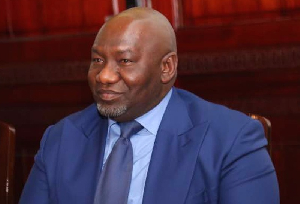Accra, (Greater Accra) 4 Nov. The government's "Gateway" programme will help sharpen the country's competitiveness to make it a more desirable investment location for both domestic and foreign investors. The programme is being implemented as a cross-sectoral collaborative effort aimed at co-ordinating and harmonizing all sector programmes, policies and initiatives, Dr. John Frank Abu, Minister of Trade and Industry, said today during his Ministry's turn to "Meet the Press". The Trade and Industry Ministry is the third in the series coming after the Ministry of Food and Agriculture and the Greater Accra Region. Dr. Abu said the cross-sectoral co-ordination will help remove administrative, bureaucratic and regulatory impediments that could undermine the realisation of the investment and competitiveness of Vision 2020, the government's blueprint for development. Flanked by the Deputy Minister of Trade and Industry, Mr. Dan Abodakpi and Mr. Ekow Spio-Garbrah, Minister of Communications, Dr. Abu explained that the ''Gateway'' programme consists of export processing zones, free ports and liberalised skies. These will enable investors to use Ghana as a base to manufacture value-added products, assemble, package, store, and distribute goods to the West African sub-region. The programme will also encourage investors to set up financial, banking, telecommunications and transport services and therefore transform Ghana into an economic hub in the sub-region. Dr. Abu said since the beginning of its implementation in early 1996, the programme has identified constraints to investment and trade after interacting with 30 institutions. A document on the constraints was circulated in mid-1996 and implementation of suggested solutions have been started by the Front-line Owners Association, Ghana Export Promotion Council and the Ghana Investment Promotion Centre. The Minister said for the future, attention will be focused on identification of projects to support the successful implementation of the programme as well as the continued identification of legislative instruments that require review or change. Dr. Abu described trade liberalisation as ''a good policy in itself, but in Ghana, its implementation has produced some adverse consequences". He said in order to address its unintended effects, government had taken some actions and ''is in the process'' of instituting others to address some of the concerns expressed by the public and manufacturers in particular. The Minister said a legislative instrument was passed to ensure that unwholesome food and hazardous drugs especially are not imported. There is also a testing requirement in force which mainly covers the levels of radioactivity in milk and wheat products, the wholesome quality of food and drugs as well as standard quality testing for certain imports. The pre-shipment inspection agencies are responsible for ensuring that overseas tests satisfy the prescribed domestic standards. Dr. Abu said the pre-shipment companies and the Ghana Standards Board have been empowered to inspect all second-hand goods, some of which have already been banned, so that goods that are considered hazardous to health or to the environment are not brought into the country. Dr. Abu said the government anticipates some changes in policy over the next few years and this would require a major review of the operating institutional framework. A critical part of this process is expected to be a much more enhanced role for dialogue and consultation with the private sector which currently ''takes place within the context of the private sector advisory group and the Private Enterprise Foundation (PEF)''. The Minister emphasised that the government's policies and measures are to enhance Ghana's industrial and export supply capabilities and market access for her exports. They are also to provide a conducive legal and administrative machinery for export-oriented investments. When a questioner asked why President Rawlings has been at the forefront of the trade and investment drive abroad, Mr. Abodakpi explained that in view of the globalisation of trade, ''trade diplomacy'' has become the responsibility of heads of state. ''So it is in order for the President to take centre-stage at re- focusing world's attention on Ghana''. Mr. Spio-Garbrah who chaired the function, said there are only three trade attaches in Washington, London and Geneva, and they cannot cope with the volume of work in projecting Ghana.
General News of Wednesday, 5 November 1997
Source: --












